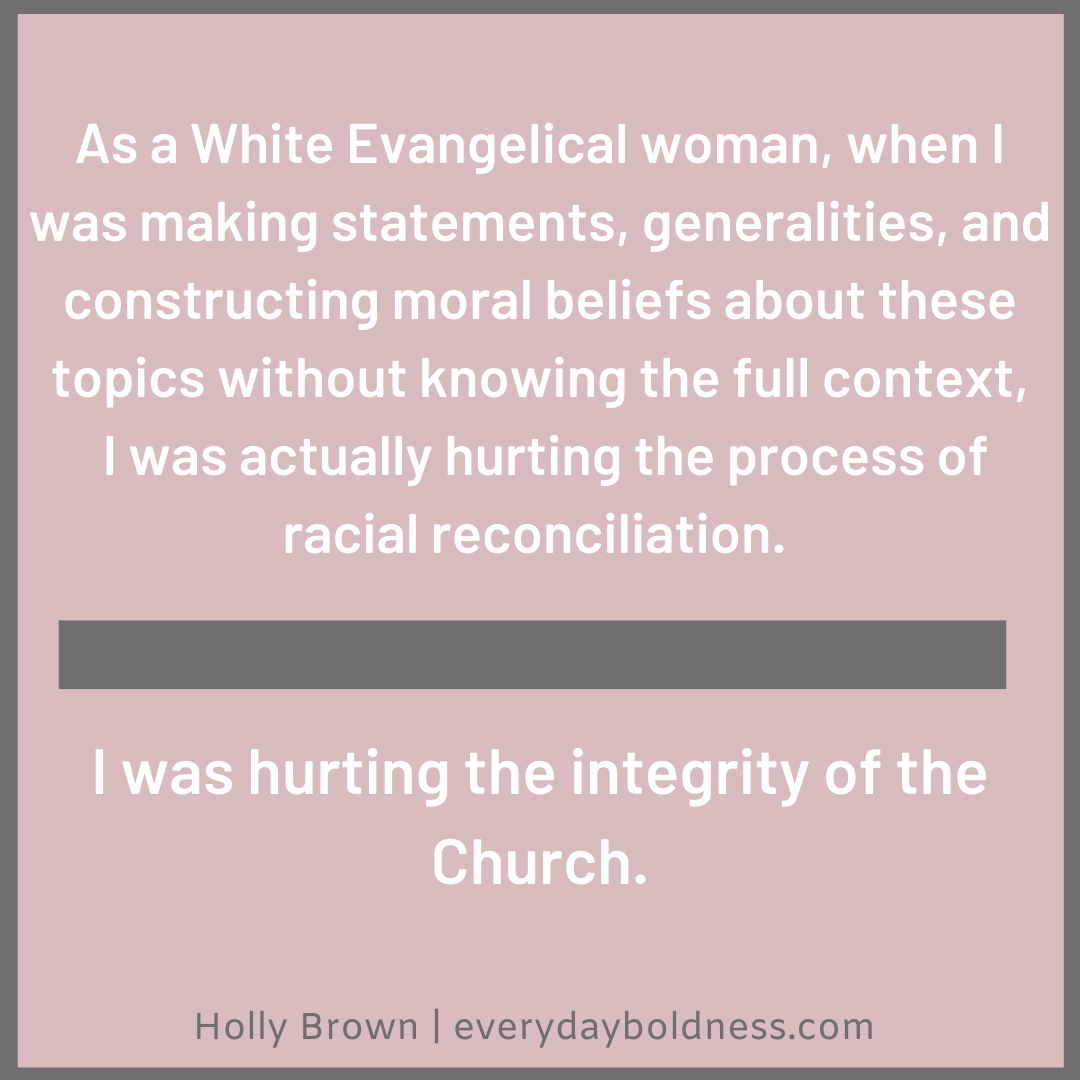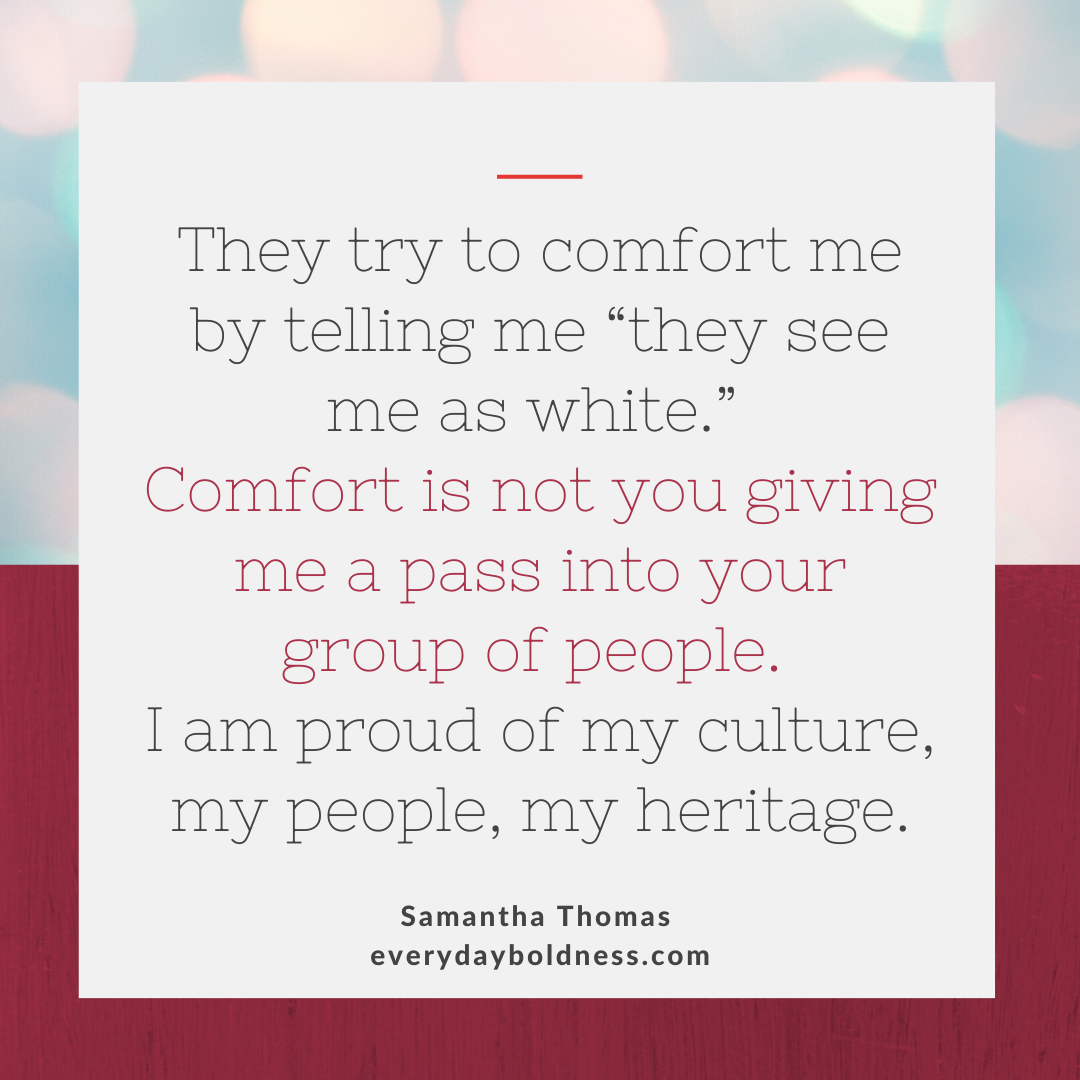|
When Aaron and I were engaged, we, like many couples went through pre-marital counseling. I will never forget when we talked about how our racial difference would affect our marriage. We had been asked to consider how we would respond if someone disagreed with us being in an interracial marriage. I said somewhat flippantly, “they can get over it.” Aaron responded with a serious tone, “That’s something that weighs on me because I want to ensure Holly’s safety, and I know that some people will have an issue with it. I can’t control how others might respond to us.” The counselor than confronted me with the truth that not only was I not listening to Aaron but I was also dismissing his experiences and concerns for this new reality that I would be entering into. I was responding out of my White privilege, whereas Aaron was responding out of his life experience as a Black man. That’s the first moment that I distinctly remember the realization that my reality has been different due to the color of my skin. That was the first time that I remember specifically being confronted with the fact that my knowledge and beliefs about the way the world works was not the way it worked for everyone.
Like with most things, as I began trying to listen more and argue less, I started to learn. However, if I’m being honest with you, I didn’t want to accept what I was hearing initially. To hear that I had a privilege and consequently, was ignorant on certain issues, was hard for me to accept. Yet, as I continued to listen to others with different experiences than mine, I started seeing the defensiveness in my mindset. When I thought about it realistically, why do I think that my White opinion on the experiences, struggles, and injustices of People of Color is more accurate than the accounts of those very People of Color? Every time I dismissed an injustice, found a reason to justify an unwarranted death, or explained away a microaggression, I was, in reality, trusting my opinion more so than the person’s opinion who actually experienced the hardship. In what other realm do I operate that way? When someone is struggling with the loss of a loved one, I don’t explain away their feelings. When a woman expresses her disgust about an inappropriate comment yelled to her, I don’t find a way to justify the man’s actions or words. When my friend experienced a biased ruling from a judge in her court case, I didn’t side with the Judge. I was frustrated with the bias. So, why was my tendency to discount the stories of People of Color? Through this journey, I found that I really do have privilege, that I actually was ignorant on certain issues, and that I definitely need to listen more in my pursuit of racial reconciliation. Every parent will tell you that the full truth matters when knowing which child to believe. A couple weeks ago, Eliza called “Mommy! Isaiah’s eating something!” I raced into our game room to find Isaiah had a penny in his mouth. After I removed it, I gave Eliza a huge hug and told her how proud I was that she called me. Aaron and I are diligent about keeping things out of reach that could be choking hazards, so then I asked her, “Eliza, do you know where the penny was before Isaiah picked it up?” She replied, “His snack cup.” I knew there had not been a penny in his cup when I handed it to him a few minutes prior. “Eliza, how did the penny get in his snack cup?” “I put it there.” So then we had a long conversation about putting things in Isaiah’s snack cup that is not food. The full context of the truth mattered. My judgement on the situation before I had the entire story was wrong. The message that needed to be addressed with Eliza wasn’t that she had helped her brother but rather that her actions had potentially endangered her brother. As I began to go beyond listening to also researching diverse perspectives on racial inequality and systematic oppression, I started to understand that just like with my kids, not only does the context matter for the full truth of the story, it also matters for the safety of everyone involved. As a White Evangelical woman, when I was making statements, generalities, and constructing moral beliefs about these topics without knowing the full context, I was actually hurting the process of racial reconciliation. I was hurting the integrity of the Church. When I blindly dismissed the concerns, stories, and realities of individuals of Color, I dismissed opportunities to carry another’s burden, chances to pursue peace, and moments to mirror the heart of Jesus. Furthermore, I found that my beliefs about issues involving racial components had, for the most part, been drawn based on a reality that did not represent the full context of the situation. Yes, the full context of truth always matters, but it is absolutely essential when we are discussing racial issues in America. It’s not truth if we pick the parts of history that we like, make us feel good, make us feel proud to be American, or affirm our current beliefs, and then we ignore or defend the parts of the story that challenge us, that show our nation’s sinful nature, rebuke us, or confront our belief systems about our current state of affairs in this country. As someone in the majority, now is the time for me to stop rebutting and to start listening. Now is the time for me to inspect my motives, thoughts, and responses to find the areas that I’m defensive, prideful, or ignorant in. Now is the time to recognize that as a White Evangelical American, I probably do not fully understand the context of the pain, exhaustion, frustration, and fear that People of Color face regularly. Now is the time to recognize that I can’t help fix what I refuse to recognize is broken. Let’s start listening so we can start learning.
0 Comments
My 3-year old son was attacked by a dog a couple of weeks ago. It was a friend’s dog who we had been around before, but for whatever reason when the dog came to greet us at the front door, he greeted me and my daughter with excitement and saw my son and simply saw him as a threat and attacked. It was a traumatizing moment for all of us, including the dog owner. Thankfully Luke was okay, and I think without the owner’s very quick reaction, we would have had a drastically different outcome. But obviously, this was a very scary moment for him. It took us a long time to calm him down, and in the days since, he still is processing it. Facing other dogs has been scary for him, and even though he has been potty trained for months, he has started having accidents again. He is latched to my side, is whinier than normal and extra sensitive. As a mom, I have a choice. I could tell him to get over it. That not all dogs are bad and most are good, so stop whining. I could tell him that it only happened once and how many times has he been around a dog and that HASN'T happened? I could tell him that it was weeks ago and it's time to move on. Or I can choose to comfort him. To gently remind him that I am here. I can hold him when he needs me. I can be heartbroken to see him so scared and anxious and be the strength he needs until he doesnt feel afraid anymore. I can choose compassion. I am half Guatemalan and half Mexican. I am married to a white man. We are an interracial couple. As a latina woman, I have been called a spic, illegal, a wetback. I have been asked COUNTLESS times “where are you from?” and when I respond “I was born and raised in the Tulsa area,” I get the reply “No...where are you REALLLY from.” I have been treated differently on multiple occasions just because of the color of my skin. And the worst of all and more often than the rest, I have experienced tokenism. Tokenism is defined as the practice of making only a perfunctory or symbolic effort to do a particular thing, especially by recruiting a small number of people from underrepresented groups in order to give the appearance of sexual or racial equality within a group of people. So that is me. Your token hispanic girl. Right along with your token black and asian people to make a certain group appear to be “diverse” and feel good about it. Can I be honest with you? This is something that is not fun to type, and I know it won’t be fun to read. During this movement for racial equality over the past few months, it has not been the conversations with our black friends that have been difficult. The most difficult conversations by far have been with my white, Christian friends. They choose to see this as something political rather than a human rights issue. They choose to call the Black Lives Matter movement anti-Christian and anti-life rather than to take a moment to pause and try to understand the hurt that is being shared by the black population. I try to explain to them that my experiences pale in comparison to the experiences of my black friends, but I can understand their pain on a small level because I have experienced prejudice and racism multiple times in my life. Sadly, many of my white, Christian friends don’t want to hear my stories. They try to justify my pain and make excuses for people they've never even met. Or they simply tell me I could be exaggerating because I was so young. They try to comfort me by telling me “they see me as white.” Comfort is not you giving me a pass into your group of people. I am proud of my culture, my people, my heritage. I love that I am hispanic. These are only a few of many examples of racism that can hide in the hearts of those submersed in white culture without even realizing it. So instead of making excuses, instead of dismissing my pain, and instead of crowning me as an honorary white person, could we instead try to have a bit more compassion? In our current climate, we could certainly afford to have it. In Mark 8, Jesus had compassion on the crowd because they had been with Him 3 days and had nothing to eat. He fed them. In Matthew 9, Jesus went through all the cities and villages, teaching in synagogues, sharing the gospel and healing the sick. And when he saw crowds, it says he had compassion for them “because they were harassed and helpless, like sheep without a shepherd” (verse 36). In Luke 7, Jesus had compassion on a widow who had just lost her only son and comforted her before raising him from the dead. Compassion is a GOOD thing! We have all heard the greatest commandment. “You shall love the Lord your God will all your heart and with all your soul and with all your mind. This is the great and first commandment. And a second is like it: You shall love your neighbor as yourself. On these two commandments depend all the Law and the Prophets” Matthew 22: 37-40. I genuinely believe that all the people I have had hurtful conversations with would say that they are against racism. I believe they would be shaken to their core if they saw a blatant act of racism happen right in front of them or to a friend of theirs that was a person of color. But they fail to open their eyes to all the ways that racism has been established in our minds, culture, society, etc. Systemic racism TODAY in school funding practices, employment opportunities, housing opportunities, nutrition, and the list goes on and on. JUST as I am writing this, my neighbor two doors down who is Native American had a woman roll down her window as she was driving by his home. She asked him who lives there (he was sitting out on his driveway watching his daughter play). When he responded cheerfully, “I do,” she replied “Really?” and drove off shaking her head. She ASSUMED that he did not belong by the color of his skin. It’s one thing to think it, but another to have the audacity to stop and ask. I have had this happen to a couple of friends, sadly, and in different areas of the country. Racism does exist, and whether you agree or not with the organization itself of “Black Lives Matter,” all believers should be able to biblically see example after example of Christ having compassion on the outcast, having compassion on the hurting and loving ALL people, regardless of the color of the skin or their heritage. It is beyond hurtful when a white friend reaches out and asks my thoughts, only to be slammed back with their racial opinions and ignorance in general. So here is your call to action….PLEASE have the decency to read ONE book, watch A documentary and have A conversation with a person of color about their experiences. Be open with what is going on in the world with your children and include them as much as you can. Diversify your children’s lives by diversifying YOUR life. Have an open mind, be empathetic to the experiences you can't relate to and DON’T dismiss them. This may be an intellectual conversation for you, but for them it is an emotional and vulnerable thing to reveal their pain. To dismiss them is to dismiss their experience and their humanity. In case you haven't already found a list of resources, here are a few to get started with: Books:
Shows and Documentaries:
Children’s Books:
|
About Holly's BlogHolly loves to write, and you'll find her blog covers all different topics! Categories
All
Archives
July 2020
|




 RSS Feed
RSS Feed